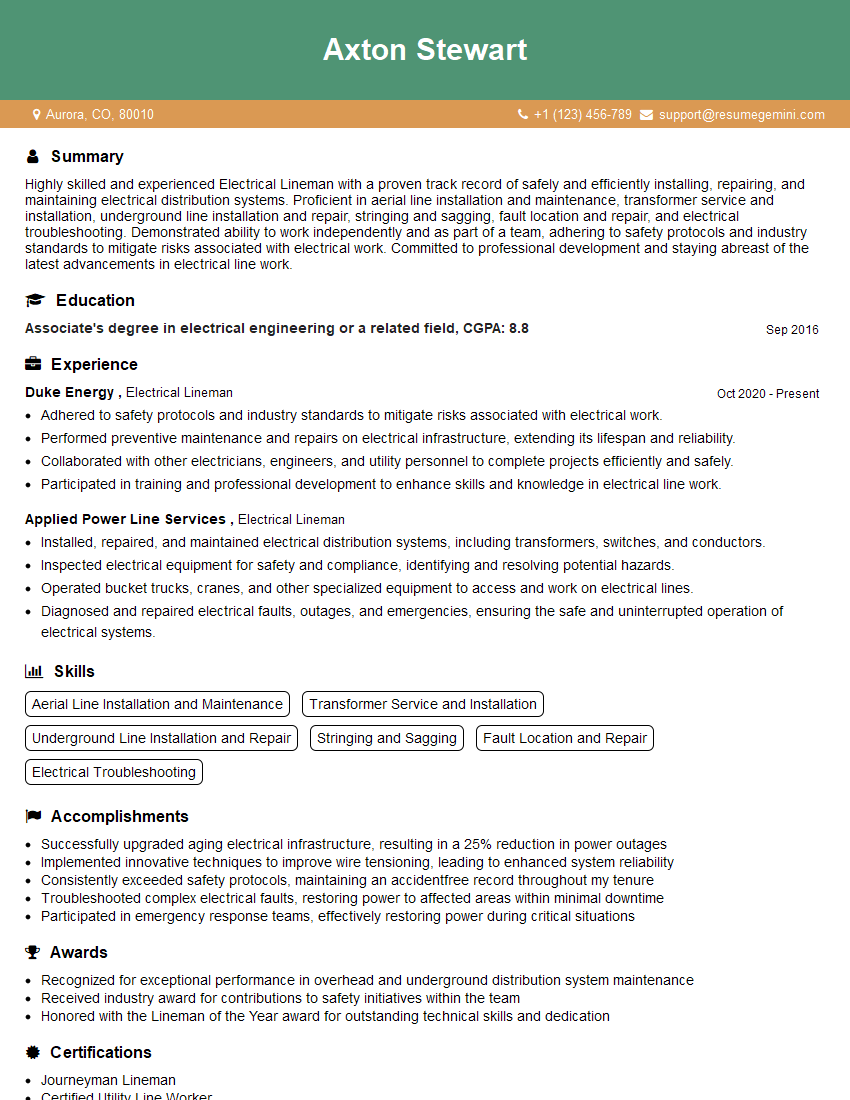Are you a seasoned Electrical Lineman seeking a new career path? Discover our professionally built Electrical Lineman Resume Template. This time-saving tool provides a solid foundation for your job search. Simply click “Edit Resume” to customize it with your unique experiences and achievements. Customize fonts and colors to match your personal style and increase your chances of landing your dream job. Explore more Resume Templates for additional options.

Axton Stewart
Electrical Lineman
Summary
Highly skilled and experienced Electrical Lineman with a proven track record of safely and efficiently installing, repairing, and maintaining electrical distribution systems. Proficient in aerial line installation and maintenance, transformer service and installation, underground line installation and repair, stringing and sagging, fault location and repair, and electrical troubleshooting. Demonstrated ability to work independently and as part of a team, adhering to safety protocols and industry standards to mitigate risks associated with electrical work. Committed to professional development and staying abreast of the latest advancements in electrical line work.
Education
Associate’s degree in electrical engineering or a related field
September 2016
Skills
- Aerial Line Installation and Maintenance
- Transformer Service and Installation
- Underground Line Installation and Repair
- Stringing and Sagging
- Fault Location and Repair
- Electrical Troubleshooting
Work Experience
Electrical Lineman
- Adhered to safety protocols and industry standards to mitigate risks associated with electrical work.
- Performed preventive maintenance and repairs on electrical infrastructure, extending its lifespan and reliability.
- Collaborated with other electricians, engineers, and utility personnel to complete projects efficiently and safely.
- Participated in training and professional development to enhance skills and knowledge in electrical line work.
Electrical Lineman
- Installed, repaired, and maintained electrical distribution systems, including transformers, switches, and conductors.
- Inspected electrical equipment for safety and compliance, identifying and resolving potential hazards.
- Operated bucket trucks, cranes, and other specialized equipment to access and work on electrical lines.
- Diagnosed and repaired electrical faults, outages, and emergencies, ensuring the safe and uninterrupted operation of electrical systems.
Accomplishments
- Successfully upgraded aging electrical infrastructure, resulting in a 25% reduction in power outages
- Implemented innovative techniques to improve wire tensioning, leading to enhanced system reliability
- Consistently exceeded safety protocols, maintaining an accidentfree record throughout my tenure
- Troubleshooted complex electrical faults, restoring power to affected areas within minimal downtime
- Participated in emergency response teams, effectively restoring power during critical situations
Awards
- Recognized for exceptional performance in overhead and underground distribution system maintenance
- Received industry award for contributions to safety initiatives within the team
- Honored with the Lineman of the Year award for outstanding technical skills and dedication
Certificates
- Journeyman Lineman
- Certified Utility Line Worker
- OSHA 10-Hour Construction Safety
- First Aid and CPR
Career Expert Tips:
- Select the ideal resume template to showcase your professional experience effectively.
- Master the art of resume writing to highlight your unique qualifications and achievements.
- Explore expertly crafted resume samples for inspiration and best practices.
- Build your best resume for free this new year with ResumeGemini. Enjoy exclusive discounts on ATS optimized resume templates.
How To Write Resume For Electrical Lineman
- Highlight your experience and skills in electrical line work, particularly in areas such as aerial line installation and maintenance, transformer service and installation, and fault location and repair.
- Provide specific examples of projects or tasks you have completed, quantifying your accomplishments whenever possible.
- Emphasize your commitment to safety and adherence to industry standards.
- Showcase your ability to work independently and as part of a team.
- Consider obtaining certifications or specialized training in electrical line work to enhance your credibility and competitiveness.
Essential Experience Highlights for a Strong Electrical Lineman Resume
- Install, repair, and maintain electrical distribution systems, including transformers, switches, and conductors.
- Inspect electrical equipment for safety and compliance, identifying and resolving potential hazards.
- Operate bucket trucks, cranes, and other specialized equipment to access and work on electrical lines.
- Diagnose and repair electrical faults, outages, and emergencies, ensuring the safe and uninterrupted operation of electrical systems.
- Adhere to safety protocols and industry standards to mitigate risks associated with electrical work.
- Perform preventive maintenance and repairs on electrical infrastructure, extending its lifespan and reliability.
Frequently Asked Questions (FAQ’s) For Electrical Lineman
What are the educational requirements for becoming an Electrical Lineman?
Typically, an associate’s degree in electrical engineering or a related field is required, along with on-the-job training and experience.
What are the key skills and abilities required for Electrical Linemen?
Strong electrical knowledge, proficiency in aerial line work, ability to work independently and as part of a team, and adherence to safety protocols are essential.
What is the job outlook for Electrical Linemen?
The job outlook for Electrical Linemen is projected to grow faster than average, due to increasing demand for electrical infrastructure maintenance and repair.
What are the potential hazards associated with Electrical Lineman work?
Electrical hazards, working at heights, and exposure to inclement weather are some of the potential hazards associated with this occupation.
What are the career advancement opportunities for Electrical Linemen?
With experience and additional training, Electrical Linemen can advance to roles such as Line Foreman, Supervisor, or Electrical Engineer.
What certifications are beneficial for Electrical Linemen?
Certifications in areas such as CPR, First Aid, and OSHA safety standards are beneficial for Electrical Linemen.
What is the average salary for Electrical Linemen?
The average salary for Electrical Linemen varies depending on experience, location, and employer, but generally falls within the range of $60,000 to $80,000 per year.